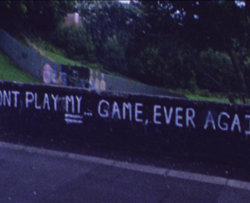Two solo shows
dal 9/4/2008 al 16/5/2008
Segnalato da
9/4/2008
Two solo shows
Gimpel Fils, London
Seamus Harahan's films record the urban environment and transforms it into something new and unfamiliar. Lee Edwards's series of etched photographs demonstrate a dedication to meticulous illustration and a preoccupation with the processes of making art.

Seamus Harahan's films record the urban environment. However, Harahan not only
documents the lived environment, but transforms it into something new and
unfamiliar. Filming marginal lives within Belfast's city center, his work changes
the mundane into something much more poetic. Combining imagery of stray dogs or a
bird flying over a tower block with pop soundtracks, as in the work Free as a Bird,
2006, he suggests alternative ways of viewing the world around us. He has described
his way of working as 'an absent minded gaze in response to the world... a benign
voyeurism - ponderous and wondering - locating yourself, locating others.' Images of
an urban park bathed in dappled sunlight reminds us that cities have rhythms and
soundtracks that are unique and which influence our perceptions of where we live.
Capturing the sights and people of Belfast and beyond in his work, Harahan's work is
unavoidably contextualised by Northern Ireland's troubled past and Gimpel Fils is
pleased to present Harahan's most overtly political work to date. Made in
collaboration with artist Miriam de Búrca, AWingBigCell is a multi screen video
filmed in the notorious Maze prison, just as demolition work was beginning. The work
follows the gaze as two people walk through the prison and offers two distinct
points of view. Although the two cameras follow the same path, each is distracted by
different details and offer personal viewpoints of the site. Situated 15 minutes
outside of Belfast and surrounded by watchtowers, the Maze prison has come to
symbolize the conflict in Northern Ireland. The films provide a sense of the scale
and labyrinthine design of the prison, whilst also evoking the acts of violence -
hunger strikes, suicides and killings - which took place within its walls. Harahan
and de Búrca's films are a powerful reminder of the legacies of a military conflict
many would prefer to forget.
Seamus Harahan received his Masters in Fine Art from the University of Ulster in
2001. He has exhibited widely, participating in group shows at Czech Museum of Fine
Art, Prague, in 2006, Transmission Gallery, Edinburgh in 2004 and The Irish Museum
of Modern Art, Dublin, in 2002. Harahan represented Northern Ireland at the 2005
Venice Biennale. More recently he has had solo exhibitions at the Museum van
Hedendaagse Kunst in Antwerp, and The Third Space, Belfast in February this year.
Seamus Harahan exhibited his work Holylands in the inaugural exhibition of Gimpel
Fils' Downstairs project space in November 2004.
.....................
Lee Edwards creates intricate and detailed works of art. His series of etched
photographs exhibited Downstairs at Gimpel Fils demonstrate a dedication to
meticulous illustration and a preoccupation with the processes of making art. Eight
photographs each measuring 4 by 6 inches depict familiar scenes: a bedroom with a
laundry rack or a living room full of furniture and carrier bags. However on closer
inspection the images dissolve and Edwards' imagination changes these everyday
spaces into something new and unfamiliar. In one work a bedroom wall transforms into
a weeping willow tree whilst in another, an exterior wall becomes see-through and
the view from a window continues into the interior space.
The intimate spaces of Edwards' work bear a lot of personal weight, recalling family
life and personal relationships. The absence of people in these images is
underscored by their symbolic presence, indicated by clothes and personal objects,
or the demarcation of personal space. A teenage bedroom suggests a longing to escape
domestic monotony, while the dreamlike quality of Saphia's Room enables the
imagination to explore the possibilities of life beyond the confines of the home.
The duality of presence and absence in Edwards' work is reiterated in the physical
properties of each photograph. His painstaking process of working, in which the
surface of the photograph is removed in thin layers, creates new and displaced
spaces underneath or beyond the depicted walls and carpets. Boundaries are blurred,
the interior of the photograph is exposed, walls become permeable and inside becomes
outside. What is additionally astonishing about Edwards' work is the visibility of
time. His etched photographs display the irrefutable fact that he has spent hours
working on each image. His skill is balanced however with his evocative imagery,
ultimately creating a body of work that is visually intriguing as well as rich with
underlying commentary.
Lee Edwards received his BA from Chelsea College of Art and Design in 2003 when he
was included in Art Review's list of 'Ten of the Best' BA Graduates. He gained his
MA in Painting from the Royal College of Art in 2005. Edwards curated the exhibition
'Silent but Violent' at The Empire in Bethnal Green, London in Sept 2006. He has
participated in numerous group shows including 'Another Product' at Cornerhouse,
Manchester in January 2005 and Artfutures, Bloomberg Space, London in 2007. This is
his first solo exhibition.
Private view: Thursday 10 April, 6-8pm
Gimpel Fils
30 Davies Street, London
Gallery opening hours: Mon - Fri 10am - 5.30pm, Sat 11am - 4pm
Free admission



